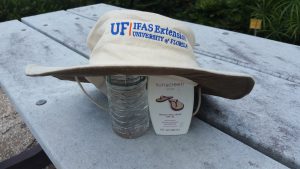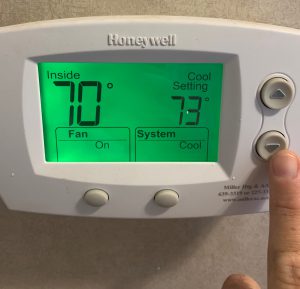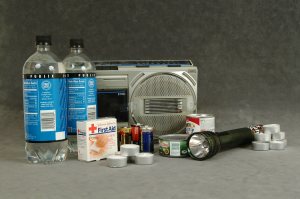
by Samantha Kennedy | Jul 16, 2020
An abundance of sunshine is one of the many reasons why so many people love Florida. In fact, it is why we are known as “The Sunshine State.” However, while the sunny days provide tons of opportunities to enjoy the great outdoors, too much sun exposure can lead to minor injury, serious illness, or even death.
The harsh UV rays from the sun can begin to damage the skin in as little as 15 minutes. In fact, even if the skin is not outwardly burned, it may be damaged underneath. Continued unprotected short-term exposure adds up over time, leading to more serious skin damage such as melanoma.

Sunscreen, ample water, and a good hat are all excellent precautions against problems with the summer sun. (Photo source: Samantha Kennedy)
Adopting a few sun safety practices greatly reduces the risk of serious skin damage. One simple practice is the daily application of sunscreen, even on cloudy days, as UV rays can penetrate cloud cover. A minimum Sun Protection Factor (SPF) of 15 is recommended for exposed skin, including lips. Do not use sunscreen past its expiration date, as it may not be as effective.
Eyes should be protected as well, as prolonged exposure to the sun can lead to vision loss or even blindness. Sunglasses which protect against both UVA and UVB rays offer the best protection. Wraparound sunglasses offer the most comprehensive protection of both the eyes and the tender skin surrounding them.
Cover other exposed skin as much as possible with dry, loose-fitting clothing whenever possible, on top of wearing sunscreen. Reapply sunscreen every two hours, especially during continuous sun exposure and after swimming, sweating, and toweling off.
Children under one year of age should be kept out of the sun as much as possible. Keep babies in the shade of a tree, umbrella, or stroller canopy at all times. Older children should follow the same precautions as those given above. Keep in mind, very young children cannot state it is too bright or too hot, so be extra vigilant.
Staying cool and hydrated is also important during those hot summer days. Even those who are acclimated to the climate can easily fall into the dangerous trap of dehydration and overheating. Paying attention to the body’s needs will help prevent heat stress and more serious heat-related illness.
The sun is at its hottest and most brutal between the hours of 10 a.m. and 4 p.m. Reducing outdoor activities between these hours can help reduce the risk of overheating. If this is impossible, be sure to take frequent breaks in a cool, shady spot to help maintain proper body temperature.
Lightweight, light-colored clothing reflects heat better than heavier, darker colors. Hats with wide brims going all the way around are ideal and offer more protection to the ears, neck, and scalp. Baseball caps are fine, but be sure to use a cloth in the back that drapes over exposed skin for more protection.
Drink plenty of fluids constantly. Plain water is the best choice to maintain proper hydration. Avoid alcohol, caffeine, and high amounts of sugar, as these can promote water loss, leading to dehydration. Find a shady spot or an air conditioned space to retreat to periodically throughout the day to keep from overheating.
Some symptoms of heat exhaustion include excessive sweating, confusion, dizziness, weakness, and nausea. Seek shade or air conditioning immediately.
Anyone experiencing an elevated body temperature, hot and dry skin, continued nausea or vomiting, and/or loss of consciousness may be suffering from heat stroke or other severe heat-related illness. Seek medical attention right away.
Florida’s sunshine draws millions of visitors a year. But for visitors and residents alike, it can be dangerous without the proper precautions. By being sun smart, the dog days of Florida’s summer will not take a bite out of the fun.
Resources:
Be Safe in the Sun (American Cancer Society)
Sun Safety (Centers for Disease Control and Prevention)
UF/IFAS is an Equal Opportunity Institution.

by Julie McMillian | Jun 22, 2020

Today’s Climate
Photo Source: UF/IFAS Photo Database
Many confuse the two words climate and weather. Weather is the day to day conditions of our atmosphere. Whereas, climate refers to the average of the weather over time. Weather depicts how we dress day to day and can change often. Climate refers more to the average weather over time. We generally must prepare for our climate by buying appropriate clothing and preparing our home for longer term weather conditions.
What causes the climate to change? There are three important greenhouse gases that have dramatically increased since industrialization: carbon dioxide, nitrous oxide and methane. The increases are primarily due to our changes in land use over time. These factors make our earth’s surface temperature warmer which affects our loss of sea ice and longer fire seasons, and can contribute to extreme weather events.

Adjust the temperature
Photo Source: Julie McMillian
The question is, what can I do in my own world and community to help on an individual basis? There are several ways that we can reduce our energy use of electricity at home which will help us to contribute to the bigger picture. Some simple suggestions are when you are not using the television, computer, lights, heating and cooling, try to turn them off or down for a while. Purchasing shades or curtains for your windows can keep your house cooler in the summer and fans may be able to replace the air conditioner on some occasions. When running the air, heat or hot water heater check your thermostat for energy saving features. Try to only run the dishwasher or washing machine with full loads and be sure to clean out your lint trap in the dryer so it has good airflow. You will find you might even save a few dollars by being mindful of your energy consumption.
Next, let’s talk about reducing greenhouse gases in our yards. Composting food scraps is a great way to reduce waste from landfills and turns your waste into reusable soil. Planting trees and plants helps to reduce carbon dioxide in the atmosphere. Plants store carbon and help to regulate temperatures in the home. Another thing to consider is, where does your water run off go? If water can be routed to your garden it is a win-win.
How do we plan our food system in our home? Reducing food waste has many benefits. We can save money, help our community, conserve energy and resources just by rethinking the way we plan our meals. If we buy more unprocessed foods, there will be less packaging. If we are able to grow our own food or just eat at home more, it cuts down on trips to restaurants and stores.
These are just a few ways to get you thinking about climate change in Florida. As a citizen, we can take action by staying informed and showing our support. If we hold ourselves accountable by looking at our personal impact, we may be surprised what we are leaving behind with our footprint. For more information on healthy living or other extension related topics, contact your local UF IFAS county extension office.
Supporting information for this article can be found in the UF/IFAS Extension EDIS publications:
Science Support for Climate Change Adaptation in South Florida
Climate Change Adaptation: New Perspectives for Natural Resources Management and Conservation
Energy Efficient Homes
UF/IFAS Extension is an Equal Opportunity Institution.

by Laurie Osgood | Jun 15, 2020

Photo Source: Laurie Osgood
With everything going on in the world today, it could be easy to forget one of the most important holidays of the year, Father’s Day. We will celebrate Father’s Day on June 21st this year, during Men’s Health Month! Father’s Day is a good time to show the men in our lives that we want them to be with us for a long time. Let’s celebrate Men’s Health Month by encouraging the men in our lives to adopt healthy habits and seek regular medical advice.
Most men do not like to go the doctor. A 2014 survey conducted by The Centers for Disease Control (CDC) determined that American men are much less likely to go to the doctor than women. Starting a conversation could encourage him to pay attention to his health as he ages. But how do we start the conversation with our father’s about their health issues? To ensure a stress-free conversation, pick a time and place with few distractions and present the topic in a loving and non-judgmental manner.
Here Are the Top Healthy Living Tips for Men:
- Schedule an annual physical exam: Annual physical exams can help spot potential problems before they get serious. Only you and your doctor can determine your best checkup and screening schedule. Preventative screenings such as an annual colonoscopy are based on a patient’s age and risk factors for developing a condition or disease, including family or personal history, age, ethnicity, and environmental exposure.
- Recognize the Signs and Symptoms of a Heart Attack: According to the American Heart Association, someone in the U.S. has a heart attack every 40 seconds. Therefore it is important for everyone to recognize the signs of a heart attack. These warning signs include pain or discomfort in the jaw, chest, arms, shoulders, neck, or back, feeling light-headed or weak and shortness of breath.
- Make sleep a priority: Many adults don’t get enough sleep. Sleep is essential for our bodies to maintain our healthy bodily functions. Sleep disorders and ongoing lack of sleep can increase the risk of heart disease, high blood pressure, stroke, and diabetes.
- Reduce Stress: High levels of stress can negatively affect a man’s lifestyle. Stress can be life threatening and can lead to a heart attack. UF/IFAS Extension’s Electronic Data Information Source (EDIS) offers a collection of information on various subjects including how to manage stress.
- Stop Smoking: Men who smoke are at a greater risk for heart disease, cancer, respiratory diseases and strokes. Quitting can help lower the risk for smoking-related illnesses. The Florida Department of Health’s Tobacco Free Florida campaign offers resources to help quit tobacco use.
- Exercise More: Regular workouts can improve heart health as well as reduce stress and weight. Experts tell us that we should all try to get at least 30 minutes of moderate physical activity each day to maintain a healthy lifestyle.
- Eat Healthy: A healthy diet should include a variety of fruits and vegetables, whole grains, lean meats, and low-fat dairy products daily. USDA offers tips for Men’s Health; 10 Tips: Get the Facts to Feel and Look Better .
Father’s Day is a great time to celebrate the men in our lives and encourage them to pay attention to their health and well-being because we want them to be around for a long time.
Going to the doctor may not be as fun as going to a ballgame or the beach, but having a conversation about their health may be the gift we can give our fathers on Father’s Day.
For more information on healthy living or other extension related topics, contact your local UF/IFAS Extension Agent.
Extension classes are open to everyone regardless of race, creed, color, religion, age, disability, sex, sexual orientation, marital status, national origin, political opinions or affiliations.

by Samantha Kennedy | Jun 11, 2020

Food and water are, with good reason, most people’s priorities when it comes to stocking their hurricane kit. However, other items are important, too, such as first aid items, sanitation supplies, and extra batteries. (Photo source: UF/IFAS File Photo)
It’s officially hurricane season here in Florida and that means it’s time to review and rebuild your disaster kit. Take some time to go through your kit and make sure you have everything you need. Use this checklist as a starting point and add whatever else you may need.
Replace expired food products and replenish your water supply. Need help deciding what kinds of food and how much water to buy? Let this shopping list be your guide! Remember, focus on nutrition. Balanced, nutritious foods will help provide much-needed, long-lasting energy during stressful times. Family and Consumer Sciences agents in Broward County, FL provide a few tips and tricks for making healthy choices.
Need advice about preparing and storing an emergency water supply? This fact sheet can help!
Keep fresh batteries on hand in all the sizes you will need to power your devices, such as flashlights, radios, and other electronics.
Protect important documents. Many items, such as wills, birth certificates, deeds and liens, and insurance papers may be hard to replace if lost or damaged in a storm. Keep hard copies safe in a waterproof, fireproof lock box. Save digital backups in multiple, secure, and portable places that can be accessed after a storm. This fact sheet provides additional tips for protecting your documents and valuables during a disaster.
Create a digital hurricane kit! Alicia Betancourt, Community Resource Development agent in Monroe County, FL, has put together a comprehensive list of online resources that can help you track the storm, stay in touch with loved ones, and plan your evacuation.
Additional Resources
Disaster Handbook (UF/IFAS)
How to Prepare for Emergencies (American Red Cross)
Ready.gov (U.S. Department of Homeland Security)
UF/IFAS is an Equal Opportunity Institution.

by Samantha Kennedy | May 11, 2020
We like to feel as if we are always in control of our lives, especially during a crisis. Being in control provides us with feelings of confidence and strength, as if nothing could ever go wrong. However, sometimes we are not in control of our lives. Sometimes our emotions can run away with us and in times of confusion and uncertainty, those emotions can leave us feeling scared and anxious.
Right now, for many of us, our world has tilted a bit off its axis. We feel as if life is a little precarious, as if the control we value has been threatened. We want to protect ourselves and our families from something we may not fully understand, and this can leave us feeling a bit helpless. While this can be a scary way to feel, let me just say this: It is okay to feel this way, especially during times of challenge and uncertainty.
The key to keeping steady on rough emotional seas is to seek out feelings of calm. Seek out activities that can help distract from the anxious feelings, even for a few minutes. Soothing activities can vary depending on the person, so it is important to find which activities work best. Here are some good examples:

A good book and a soothing cup of tea can provide an oasis of calm in a desert of uncertainty. (Photo source: Samantha Kennedy)
Reading. Books and stories can be a great escape, allowing us to get lost in a world where there are no problems or where, at the very least, the problems are not ours to worry about. When I am feeling anxious, I like to dive into a good mystery or thriller where my mind can become occupied with an intricate plot and I can break the cycle of worried thoughts swirling inside my head. Reading stories with children can help everyone take a break from stress as well.
Creating. Remember those adult coloring books we all bought years ago? Pull those out of the drawer and blow the dust off them. Those items were touted as good stress busters for a reason. Concentrating on coloring in a picture or a pattern can help calm the mind and alleviate stressful emotions. Other creative outlets work just as well, such as drawing, journaling, or playing the guitar. I enjoy practicing my hand lettering when I am feeling stressed.
Exercising. Moving our bodies infuses our muscles and brain with oxygen and releases those feel-good chemicals known as endorphins, which produce feelings of relaxation and euphoria. Exercise strengthens our bodies and boosts our emotions. The exercise does not have to be strenuous to be effective. Low-impact exercise such as yoga and tai chi can have as much of a positive effect on the mind and body as more intense exercise such as running and weightlifting.
Meditating. Meditation is often thought of as something only practiced by spiritual folks on mountaintops in Tibet. But this is an unfair stereotype. Meditation can be practiced by anyone, even children. At its most basic, it is simply a way to center and calm our mind by focusing on our breath as it moves in and out of our body. By doing this, we can simply acknowledge and quickly dismiss all extraneous thoughts, including anxious and stressful ones, thereby not allowing them to take hold. Effective meditation takes practice, but it does not have to take a long time. Even a short 5-minute meditation can help us find calm in a sea of chaos.
Finding ways to achieve calm during confusing times can help us feel more in control of our lives and can reduce feeling of stress and anxiety. For more suggestions on how to cope with stress, please read the UF/IFAS fact sheet Stress Management: Ways to Cope.
Extension classes are open to everyone regardless of race, creed, color, religion, age, disability, sex, sexual orientation, marital status, national origin, political opinions or affiliations.

by Dorothy C. Lee | May 11, 2020
Once known as star berries because of the pointy flower calyxes on top, blueberries have grown wild in North America for thousands of years. They were a staple among Native Americans, who dried and smoked the berries, and pounded them into venison to flavor the meat.

Berries such as blueberries are rich in vitamin, minerals, and antioxidants and can be delicious additions to yogurt, salads, and smoothies. (Photo source: UF/IFAS file photo)
Uses & Preparation
Wash blueberries just before using. Add to yogurt or cottage cheese or any fruit and mild cheese platter. For color and great taste, add to salads; or sweeten pancakes, cakes, and muffins.
Selection
Look for firm, dry, plump, smooth-skinned berries with a light grayish bloom. Ripe berries should be deep-purple blue to blue-black.
Storage
Cover and refrigerate fresh berries for up to 10 days. Blueberries are easily frozen for later use. Freeze unwashed blueberries in airtight, resealable plastic bags. If thawed, keep refrigerated and use within 3 days.
Blueberry Pancake Stacks
Vegetable Oil for cooking
1 cup milk
1 tablespoon vegetable oil
1 egg
1 cup all-purpose flour
1/2 teaspoons baking powder
1 teaspoon salt
1 cup fresh blueberries
Dash of nutmeg
In a mixing bowl, stir together the milk, oil, and egg. In a separate bowl, combine the flour, sugar, baking powder, salt and nutmeg. Add dry ingredients to the milk, and stir just until mixed (batter should be slightly lumpy). Gently fold in the berries. Spoon the batter onto a griddle or pan greased with vegetable oil and heated to medium-hot (dollops should be about the size of a silver dollar). Let the batter cook until the tops of the pancakes begin to bubble, then flip and cook until done. Stack and serve immediately with softened margarine and warm syrup. Makes about eighteen 2 1/2″ pancakes.
Blueberry Syrup
Combine 1 pint of blueberries and 1 cup of maple syrup in a saucepan. Heat to boiling, then lower the heat and simmer until most of the fruit has burst. Remove from heat and use a fork to mash the berries. The syrup will thicken as it cools. Store in the refrigerator for up to 2 days.
Nutrition Information: Good source of vitamin C. High in fiber. Low in calories.
Available Fresh: April – June
To learn about fresh Florida strawberries, please read our fact sheet: Panhandle Produce Pointers – Blueberries.
.For more delicious produce preparation tips, please visit: http://www.panhandleproducepointers.com.
UF/IFAS Extension is an Equal Opportunity Institution.













